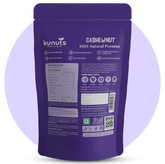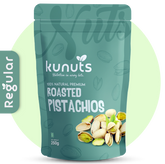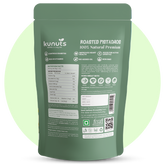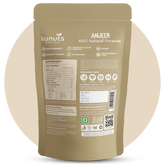Organic Green Raisins: The Superfood Your Winter Diet Needs
As winter arrives, we find ourselves longing for warmth and comfort. nourishing, and energy-packed foods increase. Organic green raisins are a powerhouse of essential nutrients among the many natural superfoods available. Whether adding them to your breakfast cereal, mixing them in desserts, or simply munching on them as a snack, these tiny dried fruits pack a nutritional punch. In this blog, we'll dive into the benefits of green raisins, their role in winter diets, and why you should choose seedless organic green raisins for maximum health benefits.

What are Organic Green Raisins?
Organic green raisins are dried grapes cultivated without synthetic pesticides or chemicals, ensuring a pure and nutrient-rich snack. They are sun-dried or shade-dried, preserving their vibrant green colour and natural sweetness. These raisins are often seedless, making them convenient for snacking and culinary use.
Nutritional Profile of Green Raisins
-
Rich in Natural Sugars:
Glucose and fructose for quick energy boosts.
-
Dietary Fiber:
Promotes digestion and prevents constipation.
-
Antioxidants:
Protect against oxidative stress and ageing.
-
Vitamins and Minerals:
High in Vitamin C, Vitamin K, iron, potassium, and calcium.
-
Low in Fat and Cholesterol-Free:
Perfect for a heart-healthy diet.
Top Health Benefits of Green Raisins
-
Boosts Immunity
Packed with antioxidants and essential vitamins, green raisins strengthen your immune system, helping you fight winter illnesses like colds and flu.
-
Improves Digestion
The high fibre content in green raisins supports a healthy digestive system, preventing bloating, constipation, and other digestive issues.
-
Enhances Bone Health
Rich in calcium and boron, green raisins contribute to stronger bones and can help prevent osteoporosis.
-
Maintains Healthy Skin
Green raisins contain antioxidants that fight free radicals, delaying skin aging and reducing the risk of skin damage during harsh winters.
-
Supports Heart Health
With potassium and low sodium content, green raisins Support healthy blood pressure levels and lower the risk of heart disease.
-
Improves Iron Levels
Green raisins are an excellent an excellent source of iron, making them particularly beneficial for individuals with anemia.
Why Choose Organic Green Raisins?
-
Free from Chemicals and Pesticides:
Safer and healthier for daily consumption. -
Environmentally Friendly:
Supports sustainable farming practices. -
Better Taste and Texture:
Natural sweetness without artificial additives. -
No Added Sugar:
Ideal for people with diabetes (when consumed in moderation).
How to Include Green Raisins in Your Winter Diet?
-
Morning Oatmeal or Cereal:
Add a handful of green raisins for a sweet twist.
-
Winter Desserts:
Use them in puddings, cakes, or kheer.
-
Trail Mix:
Combine green raisins with nuts and seeds for a quick snack.
-
Salads:
Add a handful to your winter salads for extra flavour.
-
Warm Milk:
Soak a few raisins overnight and enjoy them with warm milk in the morning.
Seedless Green Raisins: A Convenient Choice
Seedless green raisins are easier to eat and more versatile in recipes. Whether baking, cooking, or snacking, seedless varieties eliminate the hassle of biting into seeds, making them a favourite choice for many.
Conclusion
Organic green raisins are more than just a delicious treat – they are a superfood packed with essential nutrients. As winter approaches, incorporating these golden-green gems into your daily diet can boost immunity, support digestion, and keep you energetic throughout the season. Choose organic, seedless green raisins for maximum health benefits and a guilt-free snack your body will thank you for.
So, this winter, don't forget to stock up on organic green raisins and enjoy their sweet, nutrient-rich goodness!
Your Questions, Our Solutions
-
What are the key health benefits of green raisins?
Green raisins boost immunity, improve digestion, enhance bone health, support heart health, and promote healthy skin.
-
Why should you choose organic green raisins?
Organic green raisins are free from chemicals, environmentally friendly, and have better taste and texture.
-
How can green raisins be included in the diet?
Add them to cereals, desserts, salads, trail mixes, or consume them with warm milk.
-
Are green raisins good for digestion?
Yes, their high fiber content supports digestion and prevents constipation.
-
Why are seedless green raisins preferred?
Seedless green raisins are more convenient for snacking and cooking, offering a hassle-free experience.









